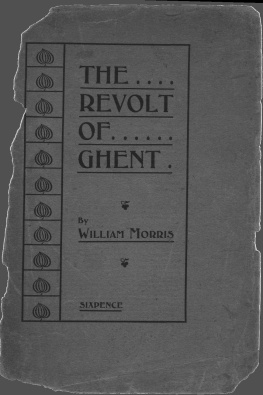William Morris - Socialism from the Root Up or Socialism Its Growth Outcome
Here you can read online William Morris - Socialism from the Root Up or Socialism Its Growth Outcome full text of the book (entire story) in english for free. Download pdf and epub, get meaning, cover and reviews about this ebook. year: 2013, publisher: Marxists Internet Archive, genre: Religion. Description of the work, (preface) as well as reviews are available. Best literature library LitArk.com created for fans of good reading and offers a wide selection of genres:
Romance novel
Science fiction
Adventure
Detective
Science
History
Home and family
Prose
Art
Politics
Computer
Non-fiction
Religion
Business
Children
Humor
Choose a favorite category and find really read worthwhile books. Enjoy immersion in the world of imagination, feel the emotions of the characters or learn something new for yourself, make an fascinating discovery.
- Book:Socialism from the Root Up or Socialism Its Growth Outcome
- Author:
- Publisher:Marxists Internet Archive
- Genre:
- Year:2013
- Rating:3 / 5
- Favourites:Add to favourites
- Your mark:
- 60
- 1
- 2
- 3
- 4
- 5
Socialism from the Root Up or Socialism Its Growth Outcome: summary, description and annotation
We offer to read an annotation, description, summary or preface (depends on what the author of the book "Socialism from the Root Up or Socialism Its Growth Outcome" wrote himself). If you haven't found the necessary information about the book — write in the comments, we will try to find it.
Socialism from the Root Up or Socialism Its Growth Outcome — read online for free the complete book (whole text) full work
Below is the text of the book, divided by pages. System saving the place of the last page read, allows you to conveniently read the book "Socialism from the Root Up or Socialism Its Growth Outcome" online for free, without having to search again every time where you left off. Put a bookmark, and you can go to the page where you finished reading at any time.
Font size:
Interval:
Bookmark:
Socialism From The Root Up
or
Socialism Its Growth & Outcome
William Morris and E. Belfort Bax
Socialism From The Root Up was first published in Commonweal , the monthly newspaper of the Socialist League, in a serialised form during the years of 1886-1888 inclusive.
Socialism From The Root Up contains twenty-five articles tracing the development of society in brief chapters.
Chapters 1-23 of Socialism From The Root Up were transcribed by Adam Moran for the William Morris Internet Archive, a subarchive of the Marxists Internet Archive in July 1998.
The Preface and Introduction were transcribed from the Second Edition of Socialism Its Growth & Outcome , London, Swan Sonnenschein & Co., LTD., New York: Charles Scribner & Sons 1896, for the William Morris Internet Archive by Ted Crawford in November 2000.
Converted to eBook format by:
Daniel M. Oberhaus
: Ancient Society
: Medival Society
: The Break-up of Feudalism
: Modern Society: Early Stages
: Preparing for Revolution: England
: Preparing for Revolution: France
: The French Revolution: Constitutional Stage
: The French Revolution: The Proletarian Stage
: The Industrial Revolution in England
: Political Movements in England
: Reaction and Revolution on the Continent
: The Paris Commune of 1871, and the Continental Movement Following It
: The Utopists: Owen, Saint Simon, and Fourier
: The Transition from Utopists to Modern Socialism
: Scientific Socialism: Karl Marx
: Scientific Socialism: Karl Marx II Money
: Scientific Socialism: Conversion of Capital into Money
: Scientific Socialism: The Production of Surplus Value: That is, of Rent, Interest, and Profit
: Scientific Socialism: Constant and Variable Capital
: Marx's Deduction of the Historical Evolution of Modern Industry
: Scientific Socialism: Conclusion
: Socialism Militant [Part 1]
: Socialism Militant [Part 2]
: Socialism Triumphant [Part 1]
: Socialism Triumphant [Part 2]
In offering this book to the public, we have to say that we thought it useless to go over the ground covered by so many treatises on Socialism, large and small, hostile and friendly, that have appeared of late years. We have dealt with our subject from the historical point of view ; this, we are aware, is a less exciting method than the building up of "practical" Utopias, or than attempting the solution of political problems within the immediate purview of the Socialist struggle of to day. On the other hand, a treatise on abstract economics, furnished with a complete apparatus of statistics, would have been more congenial to another class of mind. Nevertheless, a continuous sketch of the development of history in relation to Socialism, even as slight as it is here, should have its value if efficiently done. Our plan also necessarily deals with the aspirations of Socialists now living, toward the society of the future.
We have only further to add that the work has been in the true sense of the word a collaboration, each sentence having been carefully considered by both the authors in common, although now one, now the other, has had more to do with initial suggestions in different portions of the work.
In one of Edgar Allen Poe's tales he recounts how a little group of wrecked seafarers on a water logged vessel, at the last extremity of starvation, are suddenly made delirious with joy at seeing a sail approaching them. As she came near them she seemed to be managed strangely and unseamanly as though she were scarcely steered at all, but come near she did, and their joy was too great for them to think much of this anomaly. At last they saw the seamen on board of her, and noted one in the bows especially who seemed to be looking at them with great curiosity, nodding also as though encouraging them to have patience, and smiling at them constantly, showing as he did so a set of very white teeth, and apparently so anxious for their safety that he did not notice that the red cap that he had on his head was falling into the water.
All of a sudden, as the vessel neared them, and while their hearts were leaping with joy at their now certain deliverance, an inconceivable and horrible stench was wafted to them across the waters, and presently to their horror and misery they saw that this was a ship of the dead, the bowing man was a tottering corpse, his red cap a piece of his flesh torn from him by a sea fowl; his amicable smile was caused by his jaws, denuded of the flesh, showing his white teeth set in a perpetual grin. So passed the ship of the dead into the landless ocean, leaving the poor wretches to their despair.
To us Socialists this Ship of the Dead is an image of the civilisation of our epoch, as the cast away mariners are of the hopes of the humanity entangled in it. The cheerfully bowing man, whose signs of encouragement and good feeling turn out to be the results of death and corruption, well betokens to us the much be praised philanthropy of the rich and refined classes of our Society, which is born of the misery necessary to their very existence. How do people note eagerly, like Arthur Gordon Pym and his luckless fellows, the beautiful hope of the softening of life by the cultivation of good feeling, kindness, and gratitude between rich and poor, with its external manifestations; its missionary enterprises at home and abroad hospitals, churches, refuges, and the like; its hard working clergy dwelling amidst the wretched homes of those whose souls they are saving; its elegant and enthusiastic ladies sometimes visiting them; its dignified, cultivated gentlemen from the universities spreading the influences of a refined home in every dull half starved parish in England; the thoughtful series of lectures on that virtue of thrift which the poor can scarcely fail to practise even unpreached to; its increasing sense of the value of moral purity among those whose surroundings forbid them to understand even the meaning of physical purity; its scent of indecency in Literature and Art, which would prevent the publication of any book written out of England or before the middle of the 19th century, and would reduce painting and sculpture to the production of petticoated dolls without bodies. All this, which seems so refined and humane, is but the effect of the distant view of the fleshless grinning skull of civilisation seeming to offer an escape to the helpless castaways, but destined on its nearer approach to suffocate them with the stench of its corruption, and then to vanish aimlessly into the void, leaving them weltering on the ocean of life which its false hope has rendered more dreadful than before.
Let us then go through some of the forms through which this universal hypocrisy of modern society, which is its special characteristic, manifests itself. Our present family of blood relationship, based on assumed absolute monogamy, recognises feeble responsibility outside itself, and professes to regulate the degrees of affection to be felt between different persons according to the amount of kinship between them, so that, for instance, the brotherhood of blood would almost extinguish the sense of duty in that other brotherhood of inclination or of mutual tastes and pursuits, and in fact scarce admit that such ties could be real. Or again, in cases when, as sometimes happens, the sham blood family is broken into by the adoption of a strange child, the proceeding is cloaked by change of name, assumption of mystery, and abundance of unconscious ceremonial; and all this time, though doubtless there are plenty of examples of disinterested affection between the members of a family, as between those outside of it, yet the rule is, and our satirists are never tired of playing on this string, that though to a certain extent the bond of obligation is felt, it is burdensome none the less, and is utterly powerless to prevent the wrangling and hatred caused by the clashing of the discordant dispositions of persons doomed always to pose before the world as special friends. Another point to be noticed is the different way in which family bonds are looked upon amidst different nations even in the circle of modern Europe. In England it is true, as we have said, that all virtue, honour, and affection are supposed to be embraced within the pale of the family; this superstition is by no means so strong in France: nevertheless there is a conventional bond, there, apparently a survival of the tyranny of the civil law of the Roman Empire, that is much stronger than any family tie in England.. The family council is submitted to by all Frenchmen and Frenchwomen as a piece of unwritten law which is inexpugnable: a Frenchman cannot marry without leave of his parents before the age of twenty five; the relationship of mother and child, which with all exaggerations is more or less natural in England, is almost sacerdotal in France, and is illuminated by a curious kind of conventional sentiment in literature, which sometimes fairly degrades for the time even the greatest authors into the rank of twaddlers. We do not say that a certain amount of sentiment bred by the family system is not genuine it is reasonable to feel tenderness for the persons who have taken the pains and trouble of cherishing us in our helplessness, and to wish to pay them back with some little kindness when we no longer need that care, even when time has shown us to have no special sympathy for them: not unreasonable too to look with some special sentiment on brothers and sisters, even when manhood has drifted them away from our lives and their aspirations, since in years past we were living with them in such familiarity when they and we were innocent and undeveloped. But what relation does this light and easy yoke of sentiment bear to the iron chain of conventional sham duty which all of us, even the boldest, are oppressed by so sorely: a chain too that is broken amidst various circumstances of real and conventional disgrace whenever necessity, as to day understood, that is, commercial necessity, compels it? In short, the family professes to exist as affording us a haven of calm and restful affection and the humanising influences of mutual help and consideration, but it ignores quietly its real reason for existence, its real aim, namely, protection for individualist property by means of inheritance, and a nucleus for resistance to the outside world, whether that take the form of other families or the public weal, such as it may be.
Next pageFont size:
Interval:
Bookmark:
Similar books «Socialism from the Root Up or Socialism Its Growth Outcome»
Look at similar books to Socialism from the Root Up or Socialism Its Growth Outcome. We have selected literature similar in name and meaning in the hope of providing readers with more options to find new, interesting, not yet read works.
Discussion, reviews of the book Socialism from the Root Up or Socialism Its Growth Outcome and just readers' own opinions. Leave your comments, write what you think about the work, its meaning or the main characters. Specify what exactly you liked and what you didn't like, and why you think so.
















